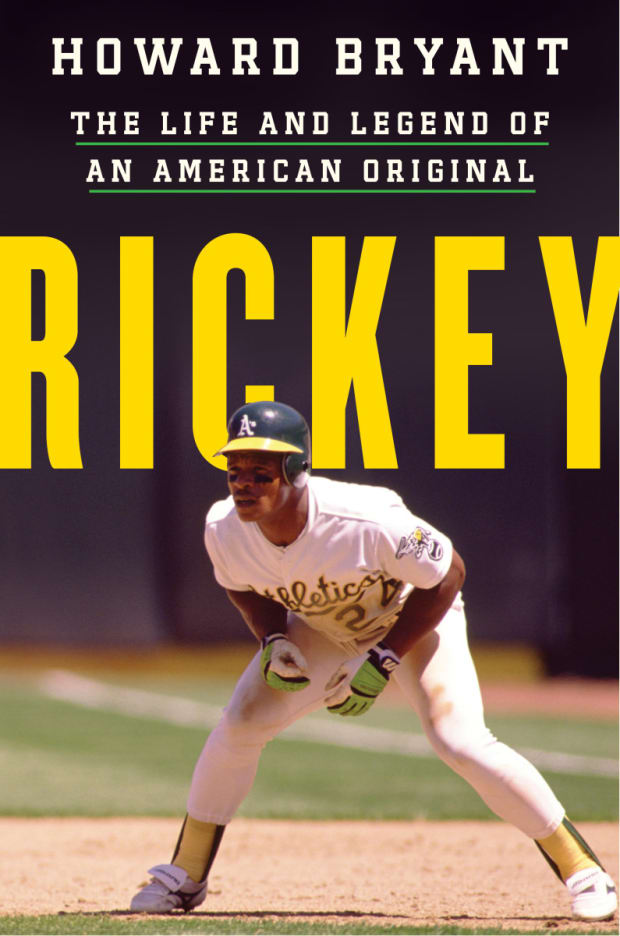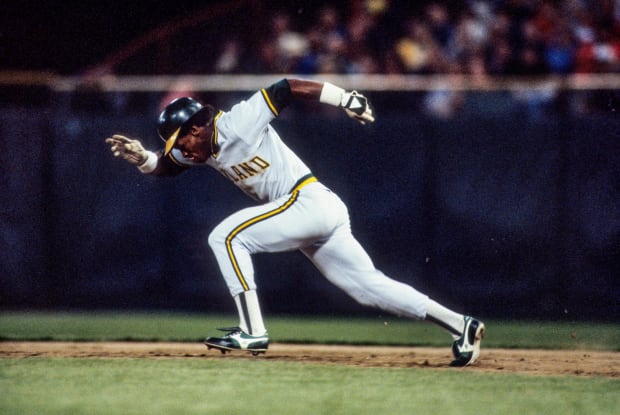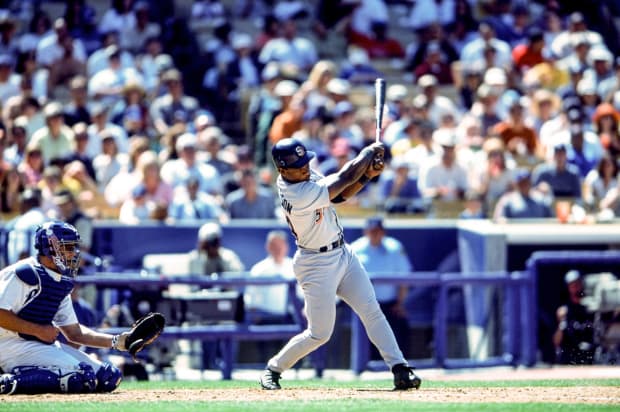Adapted from RICKEY: The Life and Legend of an American Original, by Howard Bryant. Copyright © 2022 by Howard Bryant. From Mariner Books, an imprint of HarperCollins Publishers. Reprinted by permission.

On April 25, 2001, when the season was just three weeks old and the country was entering the final months of its pre-9/11 life, Rickey Nelson Henley Henderson, aged 42 and in his second stint with the Padres, took ball four to lead off the bottom of the ninth against Jose Mesa of the Phillies. It was the 2,063rd free pass of his career, and with it Rickey passed Babe Ruth as the all-time leader in walks.
Later that year, on Oct. 4, 2001, in the bottom of the third inning against the Dodgers, Rickey stepped into the box at Qualcomm Stadium. Tie game, Rickey facing Luke Prokopec, born in 1978. The day before, the Dodgers had creamed the Padres, 12–5. There’d been nothing much to see there—except that when Rickey walked and scored in the third inning, the run tied him with Ty Cobb for the all-time lead. Now, again in the third, Prokopec tried to sneak a fastball past the old man. The crouch wasn’t as deep as it used to be, but Rickey uncoiled and connected.
Three days later, on Oct. 7, in teammate Tony Gwynn’s final game, Rickey flipped a bloop double to right against the Rockies’ John Thomson, a little dead fish in his first at bat on the first pitch he saw. It was hit number 3,000, making Rickey the 25th player in history to reach the sacred plateau.
The numbers were too big to ignore. The history he was now reaching back and touching, the names whose real estate he now shared. Rickey occupied the top shelf with Ruth ... Cobb ... Mays ... Williams ... Aaron. He was part of the 3,000 hits club—Williams and Ruth never got there. These players had become the bedrocks of the sport, and in 2001 Rickey, still an active player, had already been the all-time stolen-base king for a decade. He had even done something that season that shouldn’t have been possible—and yet it was. From Rickey’s big-league debut on June 24, 1979, to the end of the 2001 season, he had stolen 1,395 bases. During that same period, the Boston Red Sox franchise had stolen 1,382 bases. Rickey hadn’t just stolen more bases than any other player during his career—he had outstolen an entire team.
Rickey was vindicated by the numbers—he was a Made Guy now—so they told stories about him. He had become that most unique, most untouchable of characters—an American treasure and a living part of baseball folklore in the tradition of Satchel Paige and Yogi Berra. What had once made him frustrating now made him a character—and everyone laughed together. He was no longer self-absorbed for not remembering names—he was just Rickey. The people who knew him told stories about him, and people who didn’t repeated the stories they’d heard—they were too good not to be repeated. People who had never met Rickey spoke about him with a certainty that underscored his ubiquity. His legend was baseball’s legend.
And now their eyes lit up when they heard his name.
The fearsome Red Sox slugger Mo Vaughn used to call Rickey “Gas” because, Mo says, “to walk him was like putting gasoline on a fire.” Ball four, and Rickey would trot down to first. Mo would be there, a boulder of chaw ballooning one cheek.
“What up, Gas?”
“What up, baby.”
Rickey would take a few steps toward second, and Vaughn’s manager—didn’t matter which one, Butch Hobson, Kevin Kennedy, Jimy Williams—would get nervous. So would the pitcher, even strikeout guys like Roger Clemens, who could make base runners irrelevant merely by overpowering whoever was at bat. Vaughn recalls the familiar pattern: The manager would order a throw to first. Rickey would dive back, and Mo would slap a little leather on him. Another throw, another retreat to first, another swipe of the mitt from Mo. Again. And again. Finally, Rickey would call for time, emerge from the dust cloud, wipe himself off, and look at Vaughn. “He would say, ‘Dawg, I gotta go. He’s tiring me out throwing over here so much!’ ” And then Rickey would steal second. Another time, Rickey was on first, Mo gave him a little glove tap on the hip, respect for the legend. “What up, Gas? You going?” “You know I am.” And then Rickey was gone.

Heinz Kluetmeier /Sports Illustrated
There was the time, in 1990 or ’91, late in the game, when the manager, either Stump Merrill or Bucky Dent, was giving out instructions. Buck Showalter was coaching the Yankees. “Rickey was hitting against us, and he has us playing no-doubles defense,” Showalter recalls. “Guarding the lines. Don’t give up anything big. Don’t let him get in scoring position. Then [Don] Mattingly turns around and yells into the dugout, ‘What for? If he gets a single, IT’S A DOUBLE ANYWAY!’ ”
It’s May 30, 1994, the A’s made their first trip of the season to Toronto. The team bus left the Toronto Sheraton, rolled down Spadina Ave., and as it rumbled into the SkyDome passed a billboard on Blue Jays Way containing just three elements: a photo of an elated Joe Carter, the date of his epic home run and the time the ball landed in the seats to give Toronto the championship. No other words. The billboard sparked a question that bounced around the A’s bus as it pulled into the ballpark: “Where were you when Joe Carter hit the home run?” From the front to the back, players, coaches and staff recalled their whereabouts at Canada’s most famous baseball moment. Dave Feldman, the statistician for KRON-TV, the A’s television affiliate, said he was sitting on the couch, watching the game in his San Francisco apartment, totally stunned. More voices followed, with more recollections. Then a lone voice boomed from the very back of the bus. “I WAS ON SECOND BASE!”
It was Rickey.
The stories dated back a lifetime. One from 1973 that became legend, but that didn’t quite seem true: Rickey Henderson, newly minted sophomore and local legend, was cut from the Oakland Tech High School baseball team.
The new baseball coach, Bob Cryer, was Tech’s driving and training instructor. The word was that Cryer knew nothing about baseball and probably wasn’t the school’s first choice to coach the team, but he was the only one who said yes. Before anyone stretched, caught or hit a ball, Cryer literally chose his varsity team by lottery, pointing out kids at random. (“You, and you, and you to the JV.”) One of the kids banished to the JV field was Rickey. “Rickey was a Babe Ruth legend,” Rickey’s best friend, Fred Atkins, recalls. “We all told him he was making a mistake, that Rickey belonged on the varsity.” While the players pleaded with Cryer that there was no way Rickey belonged at the kids’ table, 15-year-old Rickey interrupted his new coach, a grown man, midsentence and said to him, “You must not know who I am.”
Then Rickey showed him who he was.
“The varsity and JV fields went back-to-back,” Atkins remembers. “There was no fence separating the two fields. The JV and varsity center fielders stood back-to-back. So you know what Rickey did? Whenever there was a fly ball to center from the varsity field, Rickey would spin around from the JV field and catch it. “When we were wrapping up, the coach said, ‘Did everybody hit? Is there anybody that didn’t hit?’ Rickey raised his hand, even though he was supposed to be on the JV. He ran in and grabbed a bat—and all you could hear off the bat was Ping! Ping! Ping! Ping! He was hitting rockets. When he was finished, Coach looked at Rickey and said, ‘You! You come with us.’”
Decades later, on Jan. 22, 1998, a month after celebrating his 39th birthday, Rickey was back playing for Oakland. For the fourth time. He and the A’s had agreed on a one-year, $1.1 million deal.
These 1998 A’s were entirely focused in the present on preparing for the future, on putting the pieces in place to take off—but not Rickey. His present was his future, and there was a poignancy, a sadness, and an irony to the way he carried himself that year. Ever since he made his big-league debut, the enormous size of Rickey’s ego was something all parties in the sport thought they could agree on. Yet it was Rickey’s lack of ego that would now define him. He was nearly 40, and at the plate it showed. He still had the eye of a hawk, but pitchers could beat him with sheer power because he had the reflexes of a 39-year-old. As much as the writers and the fans might love the ceremony of torch-passing, the game itself is ruthless, and no sentimentality was shown toward Rickey.
Buy Rickey: The Life and Legend of an American Original
The A’s started the season against the Big Boys. On opening night at the Coliseum, facing the Red Sox, the great Pedro Martinez made his American League debut by breezing through Oakland’s lineup, striking out 11 in seven innings and overmatching Rickey in three easy plate appearances—though Rickey did manage a walk. Three weeks into the season, whether against Hall of Fame-caliber or scrub pitching, Rickey was hitting just .189. Even his jets were sputtering. He had stolen four bases—but he was caught three times. Art Howe, the A’s manager, just watched. Howe was one of baseball’s greatest gentlemen, a good and decent man. Once a season, Howe would take the traveling beat writers out to dinner—to Ruth’s Chris in Toronto, the Cheesecake Factory in Chicago. Unconcerned about Rickey’s oddities, Howe let him play—the guy was gonna be a Hall of Famer, for God’s sake. Howe was too much of a gentleman to voice his deep suspicion that Rickey probably didn’t even know his name, but he didn’t need to: the team medical staff noticed how many times Rickey would call to Art with “manager,” and he deduced the truth. But Art Howe had been around the game for decades. He’d had his moments too, and he assessed baseball with the unsparing judgment and pessimism of the most weather-beaten scout.
Night in and night out, it was painfully clear that pitchers were easily pumping fastballs by Rickey. They were throwing nothing cute at him—no setup breaking ball to disguise the fastball, just throwing the gas. Right by him. All you had to do was challenge him. He can’t get around, Howe would say to himself as he watched Rickey from the dugout, remembering the end of his own career. “I was never a superstar like Rickey, but I played till I was 39,” Howe says. “The reflexes start to go, and you’re the only one who really knows how much you’re slipping. I’d foul a ball off and say, ‘Man, you shoulda killed that. What’s wrong with you?’ It was frustration more than anything else. In a way, it makes it easier to say goodbye. You know you’re not yourself.”

John Cordes/Icon Sportswire/Getty Images
For the guys who resided at the top, Mount Everest guys like Rickey, getting dusted by dudes whose asses they used to wear out would surely have led to nightly eruptions of frustration. The biggest guys just let it go and walked away from the game without letting the chumps they used to own get comfortable embarrassing them. They wouldn’t let them have the satisfaction of catching them on the way down, of returning the favor for being dominated all those years.
Yet while everyone else was lamenting that the great man was just a withered facsimile of his old self, wincing at the outs because they remembered when he was once the most explosive force in the sport, Rickey himself was uncommonly secure. He still laughed in the clubhouse and still talked to himself at the plate, still never caring who heard him. (Now, you know better than to swing at that, Rickey!) His willingness to keep competing, given his limitations, revealed a surprising lack of ego to the people in the game who thought they knew him but clearly did not. He even found a way to laugh at himself during the April 25 game in Baltimore when Rafael Palmeiro doubled him off first—the greatest base stealer in history fell for the hidden ball trick. Of course, there was another possibility for why he accepted these humiliations: Maybe Rickey did not know how to walk away. For 30 years, he had been marked by a singularity—by the indomitable will of the world-class athlete. (You must not know who I am!) Ahead of everything else, Rickey was always what mattered to Rickey. It had always been this way. When Rickey needed to turn it on, he had often seemed capable of just bending life to his will.
Rickey neither carried himself bitterly as he struggled, unable to accept what his body could no longer do, nor became a bore. He didn’t blather on about the old days when he was king, refusing to accept yet another strikeout and proclaiming to everyone that these whippersnappers were only outclassing him because they had youth on their side. As a result of his equanimity, a compassion developed for him, and people began to enjoy him in ways that hadn’t happened for much of the two decades he had dominated the sport. In a considerable departure from the retired legends who never stopped being pissed off that they couldn’t beat time, Rickey’s willingness to fail now made him just like everyone else. He played with the skills he currently possessed, in the moment, without looking for pity, ever willing to accept the challenge of succeeding at the world’s highest level of competition, even as his legendary body inevitably wore down.
“Rickey was very comfortable with who he was,” Steve Sayles recalls. Sayles was the A’s assistant trainer who went back with Rickey to the Padres days, and who for years was the only Black head trainer in baseball. “They were throwing fastballs right by his ass, but Rickey figured at some point you were gonna slip, and when he caught you slipping, he was gonna get you. And he knew once he got on, he could swipe a bag, he could affect the game. He always knew that even if he wasn’t the player he once was, he could always do something to hurt you.”
When the new generation tried to put Rickey’s career in the grave, the ego came back, furiously protecting him, fueling him. Take the night of April 29, 1998, in Cleveland, when center fielder Kenny Lofton decided Rickey belonged in the nursing home. Lofton, who blazed his way to lead the AL in steals in five straight years, had made his big-league debut with Houston in ’91, four months after Rickey beat Lou Brock’s all-time steals record. “And here’s Lofton across the diamond chirping at Rickey: ‘See that old man on the other side of the field? There’s a new sheriff in town. That dude is done,’” recalls Ron Washington, the A’s third-base coach at the time. “And don’t you know, Rickey just went on a tear. Second—gone. Third—gone. He’d come back into the dugout and say, ‘If Rickey sleep, let Rickey sleep.’ He just took whatever he wanted. When you talked s--- to him the way Kenny Lofton did, he reminded you that he was still Rickey Henderson. That bitch was special.”







